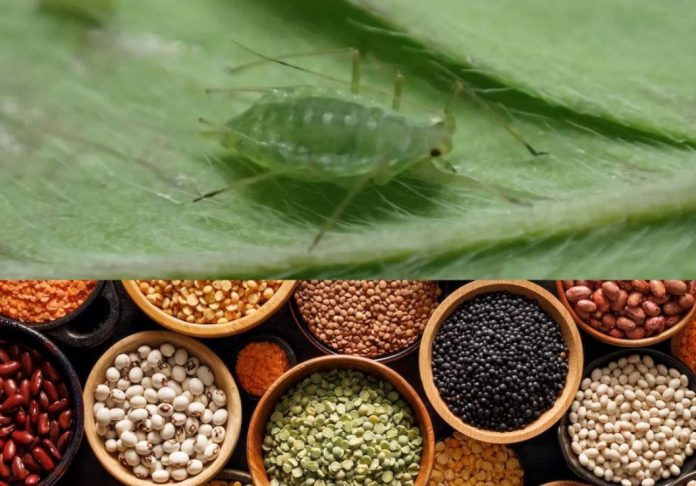News in brief:
â A study reports the first case of insecticide resistance in the globally distributed bluegreen aphids, posing a potential threat to crops such as pulses and legumes worldwide.
â The research team recommends rotating insecticides, using natural enemies, and exploring alternative control methods to address the resistance issue.
A new study published in Pest Management Science raises concerns about a potential global threat to crops. The Australian researcher team documented the first instance of insecticide resistance in the bluegreen aphids (Acyrthosiphon kondoi).
This pervasive pest is found in the United States, South America, Asia, Europe, Africa, and Australia wreak havoc on crops like pulses and legumes by feeding on leaves, stems, and buds. Additionally, it spreads harmful plant viruses like cucumber mosaic virus and bean yellow mosaic virus.
The study was led by evolutionary biologist Evatt Chirgwin of Cesar Australia, an independent research and extension company. It was prompted by reports from Australian growers that conventional insecticides were no longer effectively controlling A. kondoi populations.
Chirgwin and his team collected the aphids from lentil and alfalfa fields in Victoria, South Australia, and New South Wales where control failures had been reported.
Subsequently, laboratory tests revealed that the collected populations were moderately resistant to three major insecticide groups: organophosphates, carbamates, and pyrethroids. However, the resistance levels were not as high as those observed in some other aphid species. Yet, it was still enough to significantly impact control efforts.
Additionally, Chirgwin stated that growers cannot rely on organophosphates and carbamates (at the registered rate) to confidently control these newly evolved A. kondoi populations. He explained that the discovery of pyrethroid-resistant populations was unexpected because their use against A. kondoi is relatively limited in Australia.
The researchers suspect that exposure to pyrethroids used for controlling other pests in pulse and pasture crops might have inadvertently contributed to the development of resistance in A. kondoi.
Meantime, the study identified flupyradifurone, a relatively new insecticide not yet registered for A. kondoi control in Australia, as a potential alternative. However, Chirgwin emphasized the importance of adopting integrated pest management (IPM) strategies to reduce reliance on chemical control. This he said would also help to prevent further resistance development.
The researcher suggested ways to combat the challenge like rotating between different types of insecticides and utilising natural enemies like ladybirds and parasitoid wasps. He also advocated for the planting of aphid-resistant crop cultivars, and exploring novel control methods like endosymbiont-based interventions as key components of an effective IPM strategy.



